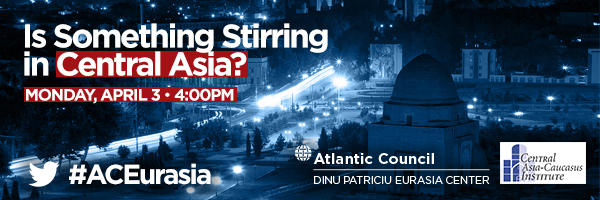Is Something Stirring in Central Asia?

Is Something Stirring in Central Asia?
Co-Hosted by the Atlantic Council and Central Asia-Caucasus Institute
Monday, April 3, 2017
4:00 p.m.
Since the death of Uzekistan’s President Islam Karimov in September of 2016, the stability that characterized key developments and overall dynamics in Uzbekistan as well as in the Central Asia region as a whole, has been undergoing a noticeable shift. Initiatives of the newly installed President Mirziyoyev in Uzbekistan and proposals regarding reforms by President Nazarbayev of Kazakhstan suggest that something may be stirring in Central Asia. This first joint forum of the Central Asia-Caucasus Institute and the Atlantic Council will present these developments, ask if they represent a real shift, and consider the implications of such changes for the Central Asia region as a whole and for its place in the world.
Speakers:
Ambassador John Herbst
Director, Dinu Patriciu Eurasia Center
Atlantic Council
Ambassador Richard Hoagland
Interim Co-chair
OSCE Minsk Group
Mr. Daniel Rosenblum
Deputy Assistant Secretary for Central Asia,
Bureau of South and Central Asian Affairs
US Department of State
Dr. Martha Olcott
Visiting Professor
Michigan State University
Moderated By:
Dr. S. Frederick Starr
Chairman, Central Asia-Caucasus Institute
American Foreign Policy Council
CLICK HERE TO WATCH THE WEBCAST
12th Floor (West Tower Elevators)
1030 15th Street NW
Washington, DC

